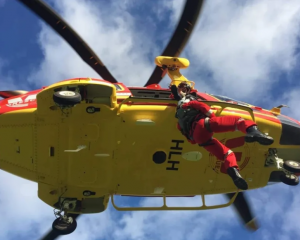
The theory has gained so much traction in the protest crowd that one of the leading organisers, Leighton Baker, posted a social media video trying to debunk it even as some believers began wearing tinfoil hats for protection.
There is currently a photograph of a number of people at the protest in Wellington wearing tinfoil hats. While in keeping with the commentary from some protesters, it is unknown whether those in the tinfoil hats are serious or performing a parody of sorts.
The Ministry of Health has identified a number of positive Covid-19 cases among those who have been attending the protest at Parliament. In the last few days, coughing and wheezing has become a common feature on livestreams from the protest site.
It has also seen those protesting turn to social media to ask for somewhere to stay after becoming ill.
One woman asked: "I have a fever and a sore throat and would so appreciate a bed for the night."
In response, another woman said: "Many are suffering from EMF effects down there and many who came home too but they don't have sort throat or cough, just vomiting, severe body pains and headaches."
All the listed effects are among the symptoms of the Covid-19 Omicron variant.
One protester in a Telegram channel has posted a video in which an "expert" uses a device to apparently measure electro-magnetic fields coming from the concrete blocks police have used to contain the device.
"There is something in this block that is emitting electro-magnetic radiation."
A video circulating on social media shows a woman from the protest saying people were developing headaches and had starting using earplugs and foil-lined fire blankets to keep themselves well.
The woman then says: "This is so funny. People are actually making tinfoil hats. Isn't that funny? But they work apparently."
Baker posted a video on his Facebook page last night in which he sought to debunk the popular rumour.
He introduced an expert in radio waves who was "not a nutter", who then talked about testing he had done in the area, saying "I've not found any anomalies after measuring this site a number of times."
Baker's expert then went on to say people were experiencing the symptoms of microwave sickness "but in a very condensed period of time". Baker's expert then said the clustering of people camping together meant they were exposed to higher levels of microwave radiation.
Baker said: "I'm fully aware a lot of people are feeling a bit stressed about it, anxious and feeling a bit funny."
The expert, who was called Andy, said people should drink water - "our blood is 93 per cent water" - to create a Faraday cage-style barrier to radiation.
"Another good thing to do is just ground yourself in bare feet ... so your body can get back in tune."
Baker also suggested those feeling ill should go to the beach and have a swim.
Public health officials in Wellington had set up a "cluster identification" system to track positive Covid-19 cases from the protest.
Medical officer of health Dr Craig Thornley said their health officials were aware of "several positive cases of Covid-19" linked to the protest, which had been listed as a location of interest.
"As protesters come to Wellington from across New Zealand, a cluster identification process has been established within the National Contact Tracing System so that we can look to monitor the number of positive cases linked to the protest."
Thornley said it was expected to be difficult to build an accurate data picture of positive cases linked to the protest site "as we anticipate reluctance from some protesters [towards] being tested".
He said health officials continued to search for ways to improve testing in "high-risk communities" to try to gather information that would reduce the impact of Covid-19 on the health system.
Thornley said there was a community testing centre at 196-200 Taranaki St which was open from 10am to 4pm, seven days a week, for people with symptoms or those who were household contacts.
If people needed advice on symptoms or how to seek care they should call Healthline on 0800 358 5453.












